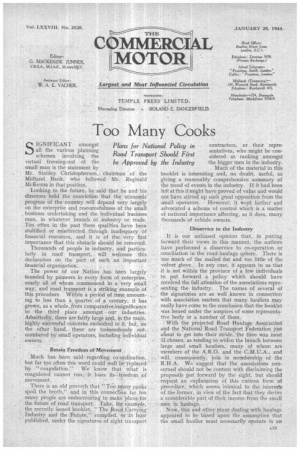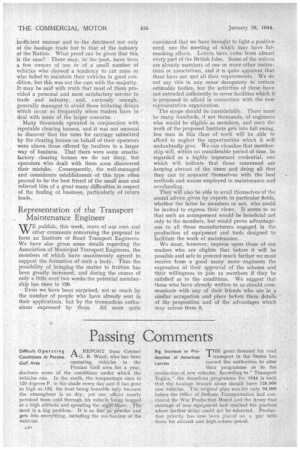Too Many Cooks
Page 17

Page 18

If you've noticed an error in this article please click here to report it so we can fix it.
SIGNIFICANT amongst all the various planning schemes involving the virtual' freezing-out of the small man is the statement by Mr. Stanley Christopherson, chairman ' of the Midland Bank, who followed Mr. Reginald McKenna in that position.
Looking to the future, he said that he and his directors hold the conviction that the economic progress of the country will depend very largely on the enterprise and resourcefulness of the small business undertaking and the individual business man, in whatever branch of industry or trade. Too often in the past these qualities have been stultified or misdirected through inadequacy of financial resources, and it is of the very first importance that this obstacle should be removed.
Thousands of people in industry, and particularly in road transport, will welcome this declaration on the part of such an important financial organization-.
The power of our Nation has been largely, founded by pioneers in every form of enterprise, nearly all of whom commenced in a very small way, and road transport is a striking example of ' this procedure. Within a period of time. amounting to less than a quarter of a century, it has grown, as a whole, from comparative insignificance to the third place amongst our industries. Admittedly, there are fairly large and, in the main, highly successful concerns embodied in it, but, on the other hand, theseare treinendously out-. numbered by small operators, including individual owners.
Retain Freedom of Movement Much has been said regarding co-ordination, but far too often this word could well be replaced by "coagulation." We know that what is coagulated cannot run; it loses its freedom of movement.
There is an old proverb that "Too many cooks spoil the broth," and in this connection far too many people are endeavouring to make plans.for the future of road transport. Take, for example, the recently issued booklet, "The goad Carrying Industry and the Future," compiled, or a t least published, under the signatures of eight transport contractors, or their representatives, who might be considered as ranking amongst the bigger men in the industry.
Much of the material in this booklet is interesting and, no doubt, useful, as giving a reasonably comprehensive summary of the trend of events in the industry. If it had been left at this it might have proved of value and would not have stirred up such great opposition from the small operators. However, it went farther and advocated a scheme of control which -is a matter of national importance affecting, as it does, many thousands of vehicle owners.
Disservice to the Industry It is our unbiased opinion that-, in putting forward their views in this manner, the authors have performed a disservice to co-operation or conciliation in the road-haulage sphere. There is too much of the mailed fist and too little of the velvet glove. In any case, it appears to us that it is not within the province of a few individuals to put forward a policy which should have received the full attention of the associations representing the industry. The names of several of the signatories are so well known in connection with association matters that many hauliers may easily have come to the conclusion that the booklet was issued under the auspices of some representative body or a number of them.
With the projected Road Haulage Association and the National Road Transport Federation just atout to get into their stride, the time was most ill chosen, as tending to widen the breach between large and small hauliers, many of whom . are members of the A.R.O. and the C.M.U.A., and will, consequently, join in membership of the R.H.A. We suggest that the associations concerned should not be content with disclaiming the proposals put forward by the eight, but should request an explanation of this curious form of procedure, which seems inimical to the interests of the former, in view of the fact that they derive a considerable part of their income from the small men in haulage.
Now, this and other plans dealing with haulage appeared to be based upon the assumption that the small haulier must necessarily operate in an inefficient manner and to the detriment not only of the haulage trade but to that of the industry of the Nation. What proof can be given that this is the case? There may, in the.past, have been a few owners of one or of a small number of vehicles who showed a tendency to cut rates or who failed to maintain their vehicles in good condition, but this was not the case with the majority. It may be said with truth that most of them provided a personal and most satisfactory service to trade and industry, and, curiously enough, generally managed to a-Void those irritating delays which occur so frequently when traders have to deal with some of the larger concerns.
Many thousands operated in conjunction ivith reputable clearing houses, and it was not unusual to discover that the rates for carriage submitted by the clearing houses on behalf of their operators were above those offered by hauliers in a larger way of business. That there were some unsatis-` factory clearing houses we do not deny, but operators who dealt with them soon discovered their mistake. Consequently, the well-managed and considerate establishment of this type often proved to be the best friend of the small man and relieved him of a great many difficulties in respect of the finding of business, particularly of return loads.
Representation of the Transport Maintenance Engineer
WE publish, this week, more of our own and other •comments concerning the proposal to form an Institute of Road Transport Engineers. We have also given some details regarding the Association of Municipal Transport Engineers, the members of which have unanimously agreed to support the formation of such a body. Thus the possibility of bringing the matter to fruition has been greatly increased, and during the course of only a little over two weeks the potential membership has then to 120.
Even we have been surprised, not so much by the number of people who have already sent in their applications, but by the tremendous enthusiasm expressed by them. All seem quite convinced that We have brought to light a positive need, one the meeting of which may have far reaching effects. Letters have come from almost every part of the British Isles. Some of the writers are already members of one or more other institu tions or associations, and it is quite apparent that these have not met all their requirements. We do not say this in any sense derogatory to certain estinaable bodies, but the activities of these have not extended sufficiently to cover facilities which it is proposed to afford in connection with thenew representative organization.
The scope should be. considerable. There must be many hundreds, if not thousands, of engineers who would be eligible as members, and once the work of the proposed Institute gets into full swing, few men in this class of work will be able' to afford to neglect the opportunities which it will undoubtedly give. We can visualize that membership will, within no considerable period of time, be regarded as a highly important credential, one which will indicate that those concerned are keeping abreast of the times and doing all that they can to acquaint themselves with the best methods and means employed in maintenance and overhauling.
They will also be able to avail themselves of the sound advice given by experts in particular fields, whether the latter be members or not, who could be invited to express their views. It seems to us that such an arrangement would be beneficial not only to the members; but would prove advantageous to all those manufacturers engaged in the production of equipment and tools designed to facilitate the work of maintenance.
We must, however, impress upon those of Our readers who are eligible that before it will be possible and safe to proceed much farther we must receive from a good many, more engineers the expression of their approval of the scheme add their willingness to join as members if they be satisfied as to the conditions. We suggest that those who have already written to us should communicate with any of their friends who are in ,a similar occupation and place before them details of the proposition and of the advantages which may accrue from it. •




















































